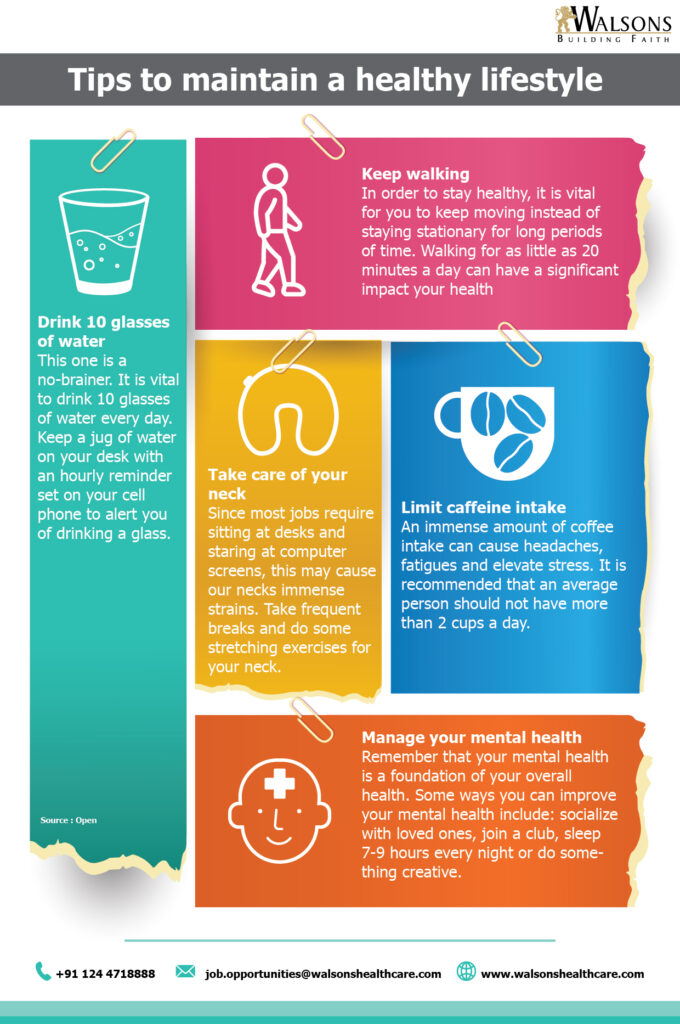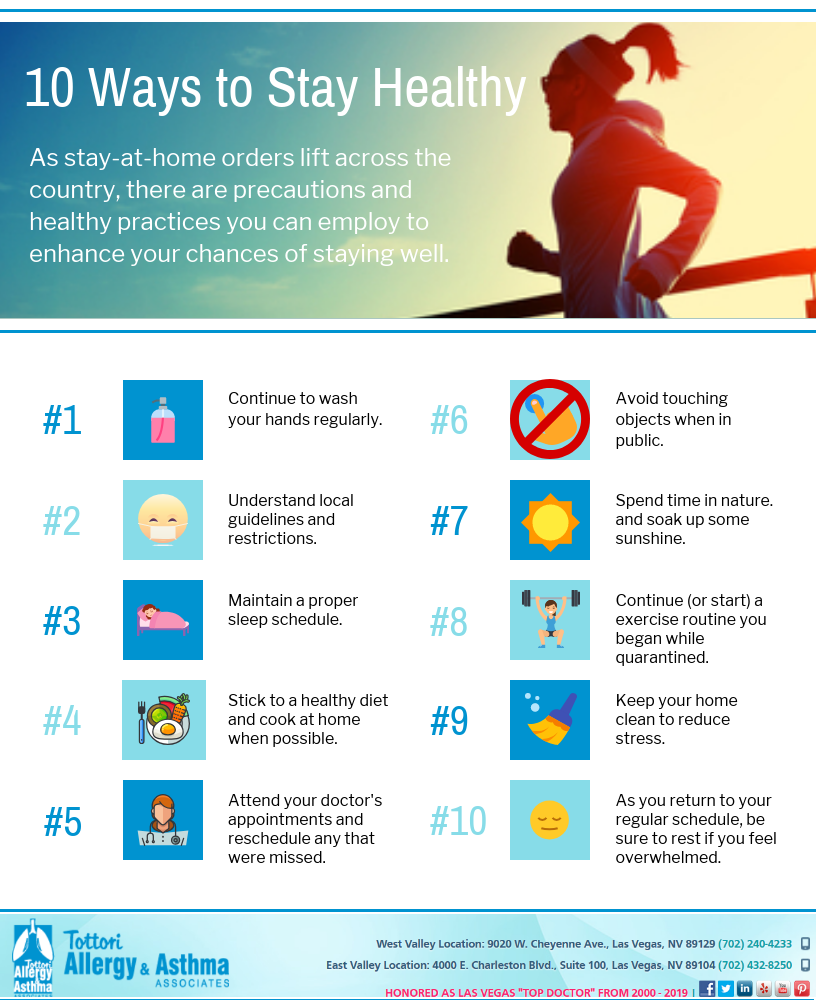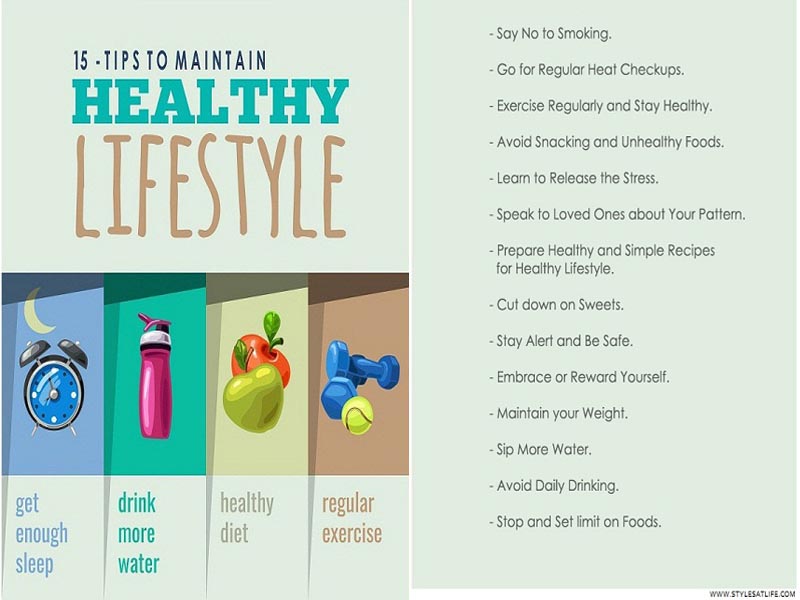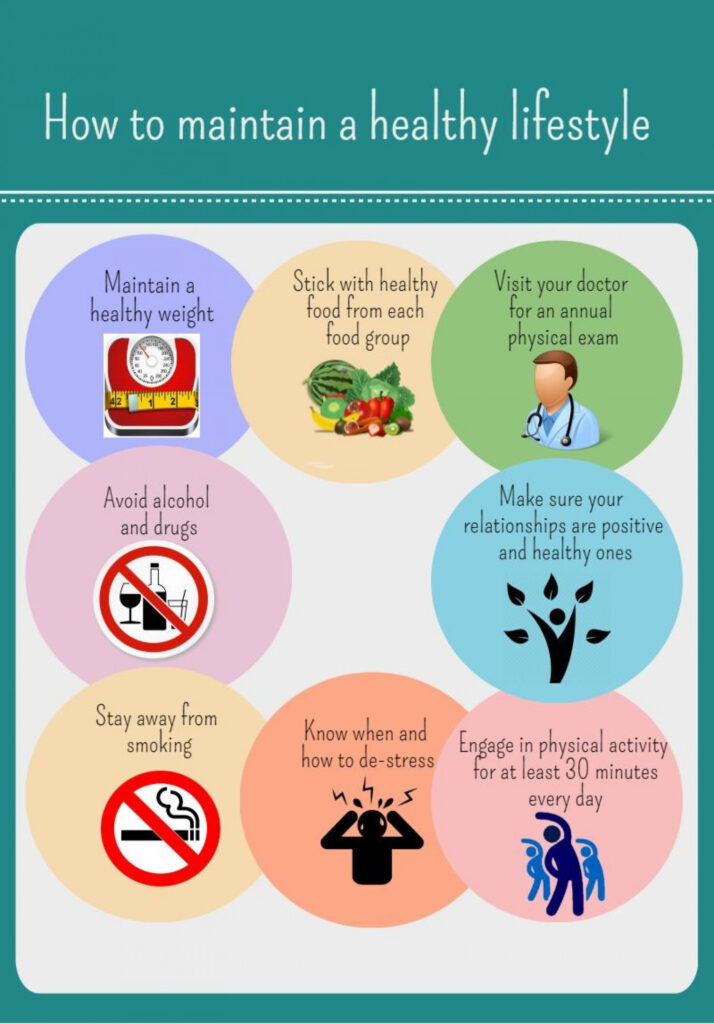Maintaining a healthy lifestyle is essential for your overall well-being and happiness. It not only helps you feel better physically but also improves your mental and emotional state. In this article, we will explore various ways to maintain a healthy lifestyle, from staying active and eating nutritious foods to managing stress and getting enough sleep. By incorporating these habits into your daily routine, you can create a balanced and fulfilling life that promotes optimal health and happiness.

This image is property of walsonshealthcare.com.
Exercise
Cardiovascular exercise
Cardiovascular exercise, also known as aerobic exercise, is crucial for maintaining a healthy lifestyle. It helps improve heart health, increase stamina, and burn calories. Engaging in activities such as brisk walking, running, cycling, swimming, or dancing can get your heart rate up and promote cardiovascular fitness. Aim for at least 150 minutes of moderate-intensity aerobic exercise or 75 minutes of vigorous-intensity exercise per week to reap the benefits for your cardiovascular system.
Strength training
Strength training is another vital component of a well-rounded exercise routine. It helps build muscle mass, increases bone density, and improves overall strength and mobility. Incorporating resistance exercises using weights, resistance bands, or bodyweight exercises like push-ups and squats can effectively target different muscle groups. Aim to engage in strength training activities at least two days a week, giving ample rest between sessions for muscle recovery and growth.
Flexibility and balance exercises
Flexibility and balance exercises are often overlooked but play a significant role in maintaining a healthy lifestyle, especially as we age. Activities like yoga, Pilates, tai chi, and stretching can improve flexibility, enhance range of motion, and help prevent injuries. These exercises also enhance balance and stability, reducing the risk of falls. Adding flexibility and balance exercises to your routine a few times a week can significantly improve your overall physical wellbeing.
Nutrition
Balanced diet
A balanced diet is essential for maintaining a healthy lifestyle. It involves consuming a variety of foods from different food groups in appropriate proportions to meet your body’s nutritional needs. Include whole grains, fruits, vegetables, lean proteins, and healthy fats in your meals. Limit the intake of sugary foods, processed snacks, and unhealthy fats. Strive for moderation and portion control to ensure a well-rounded and nutrient-rich diet.
Meal planning
Meal planning is a useful strategy to ensure you make healthy food choices and avoid impulsive decisions that may hinder your progress towards a healthy lifestyle. Plan your meals ahead of time, including breakfast, lunch, dinner, and snacks, to ensure a well-balanced diet. Consider incorporating foods with different colors and textures to make your meals more visually appealing and enjoyable. Make a grocery list and stick to it to avoid buying unhealthy options.
Portion control
Portion control is key to maintaining a healthy weight and preventing overeating. Be mindful of the serving sizes recommended for different food groups and try not to exceed them. Use smaller plates and bowls to help control portion sizes. Focus on eating slowly and savoring each bite, allowing your body to register feelings of fullness. It’s also helpful to listen to your body’s hunger and fullness cues to avoid overeating.
Hydration
Staying hydrated is crucial for overall health and wellbeing. Aim to drink an adequate amount of water throughout the day, as it helps maintain healthy bodily functions, supports digestion, and regulates body temperature. Carry a reusable water bottle with you as a reminder to drink water regularly. Avoid sugary drinks and limit the consumption of beverages that may dehydrate you, such as alcohol or excessive caffeine.

This image is property of tottoriallergy.com.
Sleep
Importance of sleep
Getting enough quality sleep is essential for maintaining a healthy lifestyle. Sleep plays a vital role in physical and mental restoration, promoting overall wellbeing. It helps improve cognitive function, enhances the immune system, and supports emotional and mental health. Lack of sleep can lead to an increased risk of developing chronic conditions, such as obesity, diabetes, and cardiovascular disease. Aim for 7 to 8 hours of uninterrupted sleep each night to reap the numerous benefits.
Establishing a sleep routine
Establishing a consistent sleep routine can greatly improve the quality and duration of your sleep. Going to bed and waking up at the same time every day, even on weekends, helps regulate your body’s internal clock. Create a relaxing pre-bedtime routine, such as reading a book, taking a warm bath, or practicing relaxation techniques, to signal your body that it’s time to wind down. Avoid stimulating activities, electronic devices, and heavy meals close to bedtime, as they can interfere with sleep.
Creating a conducive sleep environment
Creating a sleep-friendly environment is essential for a restful night’s sleep. Ensure your sleep environment is cool, dark, and quiet. Use blackout curtains or an eye mask to block out any unwanted light, and use earplugs or white noise machines to mask any disruptive sounds. Invest in a comfortable mattress, pillows, and bedding that suit your preferences and promote proper spinal alignment. Limit the use of electronic devices in the bedroom to avoid unnecessary distractions and promote relaxation.
Stress Management
Identifying stressors
Identifying and understanding the sources of stress in your life is the first step in effectively managing them. Take some time to reflect on situations, people, or events that trigger stress for you. It could be work-related pressures, personal relationships, financial concerns, or even internal thoughts and worries. Once you’ve identified your stressors, you can begin to develop strategies to cope with them more effectively.
Relaxation techniques
Relaxation techniques are valuable tools for managing stress and promoting overall wellbeing. There are several techniques you can try, including deep breathing exercises, progressive muscle relaxation, guided imagery, and mindfulness meditation. Take regular breaks throughout the day to engage in these techniques, even if it’s just for a few minutes. Practicing relaxation techniques can help reduce anxiety, lower blood pressure, and improve mood.
Mental health support
Seeking mental health support is crucial if you’re experiencing chronic or overwhelming stress. There are various resources available, including therapists, counselors, support groups, and helplines. Don’t hesitate to reach out for professional help if you feel like your stress is impacting your daily functioning or overall quality of life. Remember that seeking support is a sign of strength, and you don’t have to face your stress alone.

This image is property of www.fitpaa.com.
Hygiene
Personal hygiene
Maintaining good personal hygiene is not only important for physical health but also for our overall sense of wellbeing. Regularly showering or bathing and practicing proper grooming habits can help prevent the spread of germs and minimize body odor. Brush your teeth at least twice a day, floss daily, and schedule regular dental check-ups to maintain good oral hygiene. Clean and trim your nails regularly to prevent bacteria buildup. Taking care of your personal hygiene can promote self-confidence and improve your overall health.
Oral hygiene
Oral hygiene is essential for maintaining healthy teeth and gums. Brush your teeth at least twice a day using fluoride toothpaste and a soft-bristled toothbrush. Don’t forget to clean your tongue to remove bacteria and freshen your breath. Incorporate flossing into your daily routine to remove plaque and food particles between your teeth. Regular dental check-ups and professional cleanings are also crucial for identifying and addressing any potential oral health issues.
Hand hygiene
Practicing proper hand hygiene is one of the most effective ways to prevent the spread of germs and infections. Wash your hands thoroughly with soap and water for at least 20 seconds, especially before and after eating, after using the restroom, after coughing or sneezing, and after being in public places. If soap and water are not available, use an alcohol-based hand sanitizer that contains at least 60% alcohol. Avoid touching your face, mouth, or eyes with unwashed hands to minimize the risk of transmitting infections.
Social Connections
Maintaining relationships
Maintaining strong and healthy relationships with family, friends, and loved ones is essential for our emotional and mental wellbeing. Make an effort to regularly connect and spend quality time with the people who matter to you. Engage in meaningful conversations, listen actively, and show empathy and support. Plan social activities or outings together to strengthen your bonds and create lasting memories. Building and maintaining healthy relationships can provide a sense of belonging and support during both good and challenging times.
Joining social groups or clubs
Joining social groups or clubs with shared interests can be a great way to meet new people and expand your social network. Consider joining a sports team, book club, volunteer organization, or hobby group that aligns with your interests. Engaging in activities alongside like-minded individuals can foster new friendships and provide a sense of community. It’s an opportunity to exchange experiences, learn from others, and enjoy the benefits of social interaction.

This image is property of stylesatlife.com.
Mindfulness and Meditation
Benefits of mindfulness and meditation
Practicing mindfulness and meditation offers numerous benefits for our overall wellbeing. It helps reduce stress and anxiety, enhances self-awareness, and improves focus and concentration. Mindfulness and meditation techniques also promote emotional resilience and foster a positive mindset. Regular practice can lead to improved sleep, increased compassion, and a greater sense of inner peace and contentment.
Practicing mindfulness
Mindfulness involves paying attention to the present moment without judgment, fully experiencing each sensation, thought, or emotion. You can incorporate mindfulness into your daily life by being fully engaged in mundane activities like eating, walking, or washing dishes. Practice deep breathing and focus your attention on the present, letting go of distractions and negative thoughts. Gradually increase the duration of mindfulness exercises to experience the maximum benefits.
Types of meditation
There are various forms of meditation that you can explore to find the one that works best for you. Some common types include:
- Breath-focused meditation: Concentrating on your breath and observing each inhale and exhale.
- Loving-kindness meditation: Cultivating feelings of love, compassion, and goodwill towards yourself and others.
- Guided visualization: Imagining yourself in a serene or peaceful setting, guided by an audio recording or your own imagination.
- Mantra meditation: Repeating a word or phrase silently or aloud to focus your mind and evoke a sense of calm.
Find a meditation style that resonates with you and integrate it into your daily routine for a healthier mind and greater overall wellbeing.
Avoiding Harmful Substances
Quitting smoking
Smoking harms nearly every organ in the body and significantly increases the risk of various health conditions, including lung cancer, heart disease, and respiratory problems. If you currently smoke, quitting is the best thing you can do for your health. Seek support from healthcare professionals, join smoking cessation programs, or utilize nicotine replacement therapies to increase your chances of success. Quitting smoking not only benefits your physical health but also improves your sense of smell, taste, and overall quality of life.
Limiting alcohol consumption
Drinking alcohol in moderation can be enjoyed as part of a healthy lifestyle, but excessive alcohol consumption can lead to detrimental health effects. Limit your alcohol intake to moderate levels, which is generally defined as up to one drink per day for women and up to two drinks per day for men. Avoid binge drinking and be mindful of the potential risks associated with alcohol, such as liver damage, addiction, and impaired judgment. Make informed choices and always prioritize your health and wellbeing.
Avoiding illicit drugs
Illicit drug use can have severe consequences on both physical and mental health. The use of illegal substances increases the risk of addiction, overdose, and a range of negative effects on various organ systems. It’s essential to stay informed about the dangers of illicit drugs and make choices that prioritize your wellbeing. If you or someone you know is struggling with drug addiction, seek professional help and support to overcome this challenge and embark on a healthier path.

This image is property of i.visual.ly.
Regular Check-ups
Importance of regular check-ups
Regular check-ups with healthcare professionals are essential for maintaining good health and catching potential issues early on. Routine screenings, physical examinations, and blood tests can help identify any underlying conditions or risk factors that require attention. Regular check-ups also provide an opportunity to discuss any health concerns, update vaccinations, and receive guidance on promoting overall wellbeing. Don’t neglect your health and make sure to schedule regular check-ups, even in the absence of noticeable symptoms.
Screenings and early detection
Various screenings and tests are available to detect and prevent common health conditions. These may include mammograms, Pap smears, colonoscopies, prostate-specific antigen tests, and blood pressure checks. Pay attention to age and gender-specific recommendations for screenings and consult your healthcare provider to determine which tests are appropriate for you. Early detection can significantly increase the success of treatment and improve health outcomes.
Vaccinations
Vaccinations are a crucial aspect of maintaining good health and preventing the spread of infectious diseases. Follow the recommended vaccination schedules and stay up to date with necessary immunizations, including those for flu, tetanus, measles, mumps, rubella, and others. Vaccines not only protect you but also contribute to community health by preventing the spread of contagious diseases. Consult your healthcare provider to ensure you are adequately protected through vaccinations.
Maintaining Mental Health
Seeking therapy or counseling
Maintaining mental health is vital for overall wellbeing. If you’re experiencing persistent feelings of sadness, anxiety, or struggling with your mental health, seeking therapy or counseling can be immensely beneficial. A mental health professional can provide support, guidance, and evidence-based therapies to help you navigate through challenges and develop coping strategies. Remember that taking care of your mental health is as important as taking care of your physical health.
Engaging in hobbies and activities
Engaging in hobbies and activities that bring you joy and fulfillment is an excellent way to maintain mental health. Whether it’s painting, playing a musical instrument, gardening, or hiking, find activities that allow you to unwind, express yourself, and recharge. These activities serve as therapeutic outlets, promoting relaxation, improving mood, and reducing stress. Make time for your hobbies regularly to prioritize your mental wellbeing.
Practicing self-care
Self-care is an essential aspect of maintaining good mental health. It involves nurturing your mind, body, and spirit to promote overall wellbeing. Practice self-compassion and prioritize activities that recharge and rejuvenate you. This may include taking a relaxing bath, practicing mindfulness, treating yourself to a massage, or spending quality time alone to reflect and recharge. Remember, self-care looks different for everyone, so find what works best for you and make it a priority in your daily routine.
In conclusion, maintaining a healthy lifestyle encompasses several aspects, including exercise, nutrition, sleep, stress management, hygiene, social connections, mindfulness, avoiding harmful substances, regular check-ups, and mental health maintenance. By incorporating these strategies into your daily life, you can enhance your physical, mental, and emotional wellbeing, leading to a happier and healthier you. Remember, small, consistent steps towards a healthy lifestyle can have a profound impact on your overall quality of life. Embrace these practices and enjoy the journey towards a happier, healthier, and more vibrant you.
